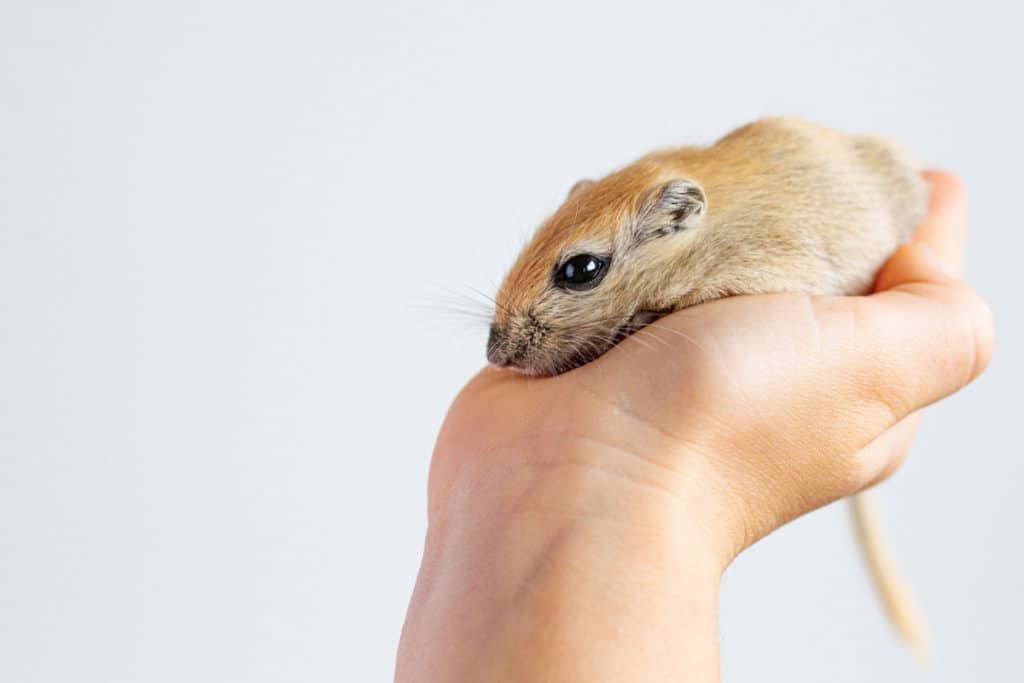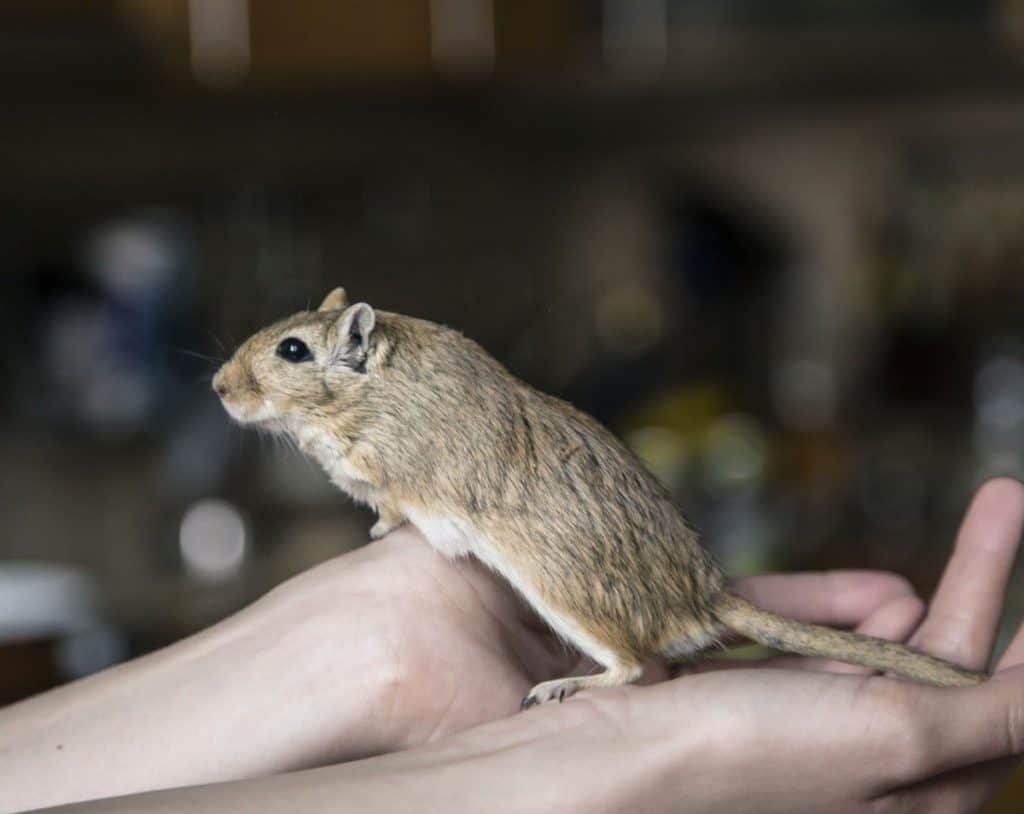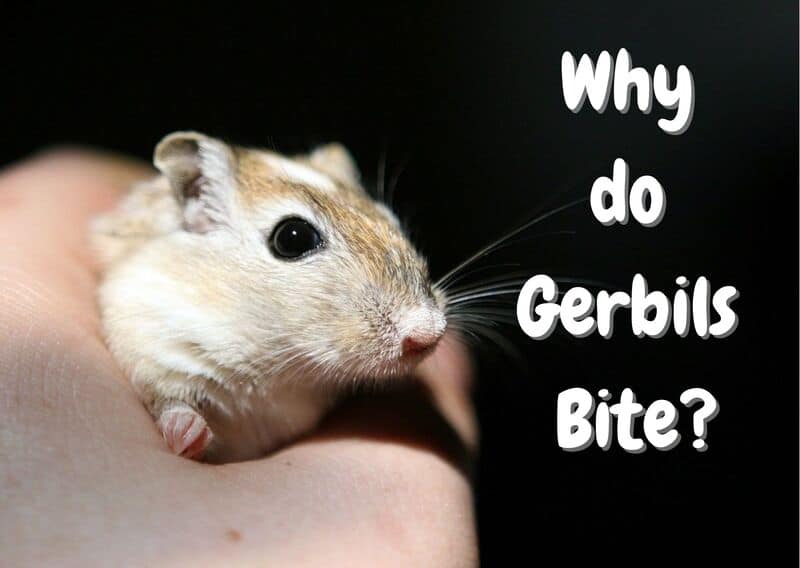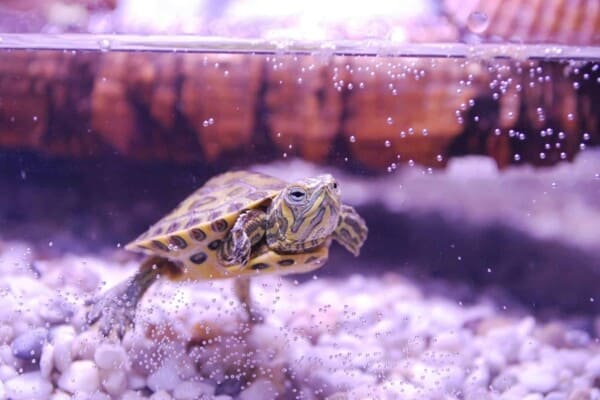Gerbils sometimes bite, especially at the beginning, when they are not used to your scent yet. There are four main reasons why gerbils sometimes bite their owners: stress, provocation, pain, and fear. Fortunately, successful training can help break that naughty habit, as we will see in this article.
Getting bitten by your pet gerbil is never a nice experience and one that you will want to avoid in the future. But why do gerbils bite in the first place?
Why Does My Gerbil Bite Me?
Gerbils are skittish critters that will react instinctively to perceived threats. There are four main reasons why gerbils will bite which we have listed below.
1- Stress
Any gerbil that is startled after being woken up for any reason can become stressed. Approaching their cage too quickly or making loud sounds causes them to get stressed out. Any animals that get close to them or their cage will certainly get them stressed as well.
2- Provocation
Don’t push your limits when trying to get your gerbil to do something. It can be from getting them to leave their cage for cleaning or playing with them. If you continue doing something they don’t like, they might feel provoked and bite.
3- Pain
Like any other animal that’s not feeling well and is in pain, they will bite. This form of protection can happen if they have fought with another gerbil or have been injured in some way. If they are injured, you might have to use gloves to carefully pick them up to take them to the vet, or they might bight you out of pain.
4- Fear
Any immediate threat that is making a gerbil feel they are in danger, like chasing them around its cage, will result in a bite. If they aren’t scared of that, it could be from being spooked by a sudden noise, pet, or a body movement you make they didn’t like. This will happen especially at the beginning when they don’t know you yet.
5 Steps to Tame Your Gerbil Not To Bite

Do you want to learn a sure-fire method to introduce and tame your gerbil in a short period? It just takes the following steps that will make them friendlier pets. After this, the chances of being bitten will be limited to certain triggers that might give them cause to bite you.
1- Week 1: Sit by their cage
The week you first get your gerbil home, you need to sit by its cage for at least an hour a day. For example, you could do any type of calm activity like reading or studying. This is so they get used to your scent and also to your voice. This way you can also see how they are getting used to their new habitat.
2- Week 2: Let them smell you
In the second week, you need to put your hand on their cage or on top of their terrarium where they can smell you. More importantly, this is so they have a better understanding that this giant hand getting close to their habitat is a friendly one. This makes it easier for them to see you aren’t an immediate threat.
3- Week 3: Offer treats in your hand
Week 3 is going to include opening the cage door and slowly putting your hand inside. If they aren’t reacting defensively then you should start to place little treats on your hand. Out of curiosity, they might come over and get these treats, then retreat to their burrow.
4- Week 4: Get them to eat from your hand
On that week it will be a challenge to have a gerbil sit in your palm and not escape. If they reach the point that they are not running away and start to eat the treat you give them, you’ve earned their trust. You can practice handing them little snacks with your free hand while they sit on your palm.
5- Week 5: Start handling them every day
After the trust is established with your gerbil sitting in your hand, you can try moving them around from hand to hand. They should be calmer at this point so you may reward them with a treat when they let themselves be handled. Doing this every day will make a gerbil appreciate you and reduce the chances of biting for no reason.
How Often Do Gerbils Bite?
The truth is that gerbils are generally peaceful and seldom bite unless they have a good reason to bite. There are triggers that come from stressful situations for the gerbil. This can happen more with smaller kids that don’t know any better, but any adult that pushed the envelope in bugging a gerbil will end with a defensive bite.
This can happen anytime or under any circumstance that makes them feel unsafe or uncomfortable, like being woken up while they are sleeping. If you try to get them out of their burrow at that time, they will feel threatened and might lash out as a result.
The initial period of getting to know them better when you first get a gerbil can also trigger them to be fearful of you. It just takes time and some steps to let them get to your scent. This way, you can earn their trust so later they won’t be scared or worried to be near or around you.
Are gerbils aggressive by nature?
There is no proof at all that gerbils are aggressive unless they get spooked or have a reason to become aggressive. What will make them react negatively is quite simple, they don’t like being confronted or pestered. They will be kind and cuddly until they are provoked into being aggressive.
Little kids are usually the first to find this out if they mishandle a gerbil the wrong way, so you always have to supervise them. Grown adults also need to be careful even if they have raised their gerbil since they were young. Gerbils can actually be confused if you don’t wash your hands and they get aggressive from smelling a different scent.
The gerbil is especially aggressive if there is another animal that is unfamiliar to them. This can be from a house pet that spooks them or gets too close.
They also aren’t especially welcoming of younger gerbils that enter their cage without a slow introduction. This can be a result of not knowing their scent and will react aggressively. Unless these young are their own litter, they won’t be so accepting right away.
How Strong is a Gerbil Bite?
Any gerbil bite can be quite painful with different results that can occur. You might get lucky just getting nipped and there isn’t any blood-letting. If the skin is broken the bite itself can be more painful for a few days after that.
A gerbil has continually growing teeth that are often sharpened like little chisels. If they have latched onto a part of your skin that is not as thick in some areas, you might get these teeth breaking through. If this happens it’s not going to help if you jerk back in horror as this can cause more pain.
It can be common to get a nip or two here and there from the very beginning but this doesn’t last very long. These smaller bites aren’t going to be as painful as when the teeth are fully grown. But if you raise them so they are used to your scent, there is less risk that you will be bitten.
Is a gerbil bite dangerous?
Gerbils don’t present any danger to people since they don’t carry any kind of illness that poses a danger to humans. Although this wasn’t always the case since recent history has shown that the European gerbil did carry a very influential illness, with Europe as a whole experiencing one of the worst epidemics in the 14th century, called… the Black Plague!
What to do (and what not to do) if a gerbil bites you
- The first thing you don’t want to do is jerk your hand around to make a gerbil let go. You can have more skin damage if you try to shake it off just from instinct. But the real truth is to calmly try not to react this way and anticipate your reaction beforehand you start holding your gerbil.
- Keep your hand low to the ground so your gerbil doesn’t fall from a threatening height. This is highly unlikely anyway since they will hold on for their own life. If they feel the ground under them they might be more inclined to let go faster. If you have to unhinge them from your skin, do it carefully even if it hurts a lot. You then need to get your gerbil back to its cage so you can treat your bite.
- Run the bitten area under cold water applying pressure to get out any bacteria. You can then clean the wound with alcohol and hydrogen peroxide if needed. Make sure you put a large band-aid on the bitten area after that.
Do gerbils actually like to be held?

These little creatures do like being held once they know you aren’t a threat to them. You can play with them in your hands and teach them little tricks that make them ideal rodents to own.
If they are standing with their hands crossed, you shouldn’t try to pick them up. This is a direct sign they are not in the best mood to do anything and back off until they calm down. If you don’t they will make bigger steps that might include being bitten.
Why do gerbils bite their cage?
Gerbils like to chew and they do this all the time to keep their teeth from growing so quickly. They chew snacks and wood to wear down their teeth, but it’s uncommon for them to chew their cage. If they are doing this it’s another telling sign they are unhappy about something.
This will be from being bored and having nothing left in their cage worth chewing. Other times it will be from a cage that is too small and from the stress of knowing they have little space for themselves. At that point, you should add on a new part of their habitat so they have more space to explore.
Do gerbils bite each other?
For the most part, gerbils are very social unless they have a reason to bite, so they rarely try to bite other gerbils. Gerbils will fight only when they feel there is a threat from another gerbil in their cage. This happens when a new gerbil is entering the same cage and shows its dominant side too soon. Pregnant gerbil females may be more irritable toward males that are in their nest and might end up biting the male.
Do gerbils bite more than hamsters and guinea pigs?
Just like gerbils, it takes careful introduction when you first get hamsters and guinea pigs so they learn who you are and how you smell. Both critters are very nervous by nature, so they get spooked easily. It takes a long time for them to get over this as opposed to gerbils, which seem to be tamed faster than their rodent relatives.
Related articles:
Resources and further reading:
- Gerbil bite anaphylaxis, Jonathan Watson, Jonathan Davis
- The effect of anti-androgens on aggressive behavior in the gerbil, Anne Sayler
Contents
- Why Does My Gerbil Bite Me?
- 5 Steps to Tame Your Gerbil Not To Bite
- How Often Do Gerbils Bite?
- How Strong is a Gerbil Bite?
- What to do (and what not to do) if a gerbil bites you
- Do gerbils actually like to be held?
- Why do gerbils bite their cage?
- Do gerbils bite each other?
- Do gerbils bite more than hamsters and guinea pigs?













